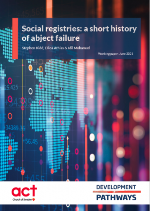| |
|
| |
|
| |
|
| |
Recognizing, reducing and redistributing unpaid care work through universal social protection: a step forward towards gender justice |
| |
|
| |
Action Against Hunger – France’s (AAH) released its latest policy brief documenting the impacts of poor women’s heavy workload on child undernutrition; and advocating for the recognition, reduction and redistribution of unpaid care work through universal social protection.
This policy brief is based on data from 29 AAH publications, covering 15 countries in 7 different regions from 2012 to 2021. It highlights the vicious circle between unpaid care work, poverty and hunger in patriarchal societies. To put an end to this vicious circle, AAH calls on the States which will be present at the Generation Equality Forum to work in favor of the reduction, recognition and redistribution of poor women’s unpaid care work, by defending the right and access of all to universal social protection floors as defined by ILO 202 recommendation. Read more
|
| |
|
| |
|
| |
Social registries: a short history of abject failure |
| |
|
| |
 |
There is much evidence to demonstrate that all social registries have failed to achieve their main aim of accurately identifying the beneficiaries of social programmes. This is largely because social registries - which are databases - generate very high levels of targeting and exclusion errors in the social programmes that use them. This report, by Act Church of Sweden and Development Pathways, examines the utility of the so-called "social registry" within social protection systems and finds that it is minimal - unless the aim is to undertake inaccurate poverty targeting. The report argues that, instead of wasting large sums of money on social registries, countries could use the funds on much better and more useful alternatives such as building Single Registries or proving identity, through the provision of birth certificates and identity cards, to all members of society.
If governments truly wish to transform their societies and support national recovery from COVID-19, the paper argues that they need to realise that social registries will only hinder them from achieving this. Read more |
| |
|
| |
|
| |
Older people are bearing the brunt of COVID-19 |
| |
|
| |
The report “Bearing the brunt” by HelpAge international provides an overview of the impact of COVID-19 on older people based on insights from research in low- and middle-income countries.
Older people are at higher risk of serious illness and their odds of survival are the lowest. Many have lost their livelihoods and can’t buy the food or medicine they need to survive.
The pandemic has also exposed ageism like never before. Older people have been separated and isolated, portrayed as weak and helpless and, their rights have been ignored. This has taken a toll on their health and wellbeing, and older people now risk facing more violence, abuse and neglect than before the pandemic. Read more |
| |
|
| |
|
| |
What's next for
social protection in light of COVID-19: challenges ahead |
| |
|
| |
In celebration of socialprotection.org’s 5-year anniversary, a global online event took place
focusing on the global health crisis. The e-Conference “Turning the COVID-19 crisis into an opportunity: What’s next for social protection?” gathered the global social protection community to provide a unique opportunity for learning and collaboration.
To further disseminate the e-conference’s key discussions, the socialprotection.org platform and the International Policy Centre for Inclusive Growth (IPC-IG) have developed two special Policy in Focus issues. This issue provides a thematic focus, delving in more depth into the main topics discussed
during the round tables, such as financing, universal basic income, linkages to food security and employment, as well as gender-, child-, and disability-sensitive programmes, among others. Read more
|
| |
|
| |
|
| |
Universal Quality Public Services |
| |
|
| |
This report on “Universal Quality Public Services”, prepared by PSI in collaboration with the New Economics Foundation, helps unions build strong arguments for extended public services as the bedrock for the Covid-19 recovery.
The Report outlines how Universal Quality Public Services are the most effective tool in achieving human rights, reducing inequality and ensuring equal access.
Drawing on effective case studies from across the world, the study demonstrates the positive effects of bolstering the public realm and ensuring public services are guaranteed as rights rather than treated as entitlements.
The report is designed to assist unions in countering the damaging and incorrect narrative, advanced by global institutions and leaders from across the political spectrum, that public spending is wasteful, that public services work better when marketised and that public sector workers are inefficent. Read more |
| |
|
| |
|
| |
Impacts of social protection on social cohesion and reconciliation |
| |
|
| |
The report “Impacts of social protection on social cohesion and reconciliation” by HelpAge International presents findings from a desk study on how national social protection programmes have promoted social cohesion and national reconciliation in post-conflict contexts internationally. The study documents and analyses the dynamics of how government-provided social protection programmes in a variety of contexts, with various design features, have contributed to national reconciliation and social cohesion. Key findings are that social protection has a documented impact on several dimensions of social cohesion and that programme design matters for the effects of social protection on social cohesion. Read more |
| |
|
| |
|
| |
DAAD Scolarships MA in SocialProtection |
| |
|
| |
The DAAD Helmut-Schmidt Scholarship supports future leaders in politics, law, economics and administration, who want to actively contribute to the social and economic growth of developing countries. This scholarship is only for the master's programme in "Social Protection", the deadline is July 31st, 2021. Read more |
| |
|
| |
|
